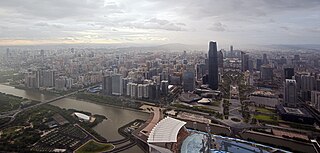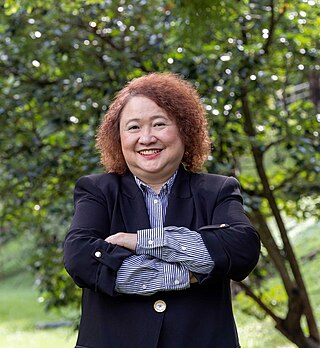Related Research Articles

Urbanization is the population shift from rural to urban areas, the corresponding decrease in the proportion of people living in rural areas, and the ways in which societies adapt to this change. It can also mean population growth in urban areas instead of rural ones. It is predominantly the process by which towns and cities are formed and become larger as more people begin living and working in central areas.

Urban geography is the subdiscipline of geography that derives from a study of cities and urban processes. Urban geographers and urbanists examine various aspects of urban life and the built environment. Scholars, activists, and the public have participated in, studied, and critiqued flows of economic and natural resources, human and non-human bodies, patterns of development and infrastructure, political and institutional activities, governance, decay and renewal, and notions of socio-spatial inclusions, exclusions, and everyday life. Urban geography includes different other fields in geography such as the physical, social, and economic aspects of urban geography. The physical geography of urban environments is essential to understand why a town is placed in a specific area, and how the conditions in the environment play an important role with regards to whether or not the city successfully develops. Social geography examines societal and cultural values, diversity, and other conditions that relate to people in the cities. Economic geography is important to examine the economic and job flow within the urban population. These various aspects involved in studying urban geography are necessary to better understand the layout and planning involved in the development of urban environments worldwide.

An urban area is a human settlement with a high population density and an infrastructure of built environment. This is the core of a metropolitan statistical area in the United States, if it contains a population of more than 50,000.
Feminist geography is a sub-discipline of human geography that applies the theories, methods, and critiques of feminism to the study of the human environment, society, and geographical space. Feminist geography emerged in the 1970s, when members of the women's movement called on academia to include women as both producers and subjects of academic work. Feminist geographers aim to incorporate positions of race, class, ability, and sexuality into the study of geography. The discipline was a target for the hoaxes of the grievance studies affair.
Erik Achille Marie Swyngedouw is professor of geography at the University of Manchester in the School of Environment, Education and Development and a member of the Manchester Urban Institute.
Urban history is a field of history that examines the historical nature of cities and towns, and the process of urbanization. The approach is often multidisciplinary, crossing boundaries into fields like social history, architectural history, urban sociology, urban geography, business history, and archaeology. Urbanization and industrialization were popular themes for 20th-century historians, often tied to an implicit model of modernization, or the transformation of rural traditional societies.
Walter Hardwick was an academic and community leader whose work shaped the city and region of Vancouver. Professor Emeritus Hardwick was involved in public life in British Columbia at the civic, regional, provincial, national and international levels. His longest service to the Province was through his teaching and scholarship; he taught in the Department of Geography at the University of British Columbia (UBC) for over thirty years. He is the father of former Vancouver City Councillor Colleen Hardwick.

The University of British Columbia Press is a university press that is part of the University of British Columbia. It is a mid-sized scholarly publisher, and the largest in Western Canada.

The University of Hawaiʻi Press is a university press that is part of the University of Hawaiʻi.

Brian Joe Lobley Berry was a British-American human geographer and city and regional planner. He was the Lloyd Viel Berkner Regental Professor in the School of Economic, Political and Policy Sciences at the University of Texas at Dallas. His urban and regional research in the 1960s sparked geography’s social-scientific revolution and made him the most-cited geographer for more than 25 years.

Pacific Affairs (PA) is a Canadian peer-reviewed scholarly journal that publishes academic research on contemporary political, economic, and social issues in Asia and the Pacific. The journal was founded in 1926 as the newsletter for the entirety of the Institute of Pacific Relations (IPR). In May 1928, PA adopted its current name, and has been published continuously since. From 1934 to 1942, the journal was edited by Owen Lattimore, then William L. Holland.
The Canadian Association of Geographers is an educational and scientific society in Canada aimed at advancing the understanding of, study of, and importance of geography and related fields. CAG publishes the quarterly peer-reviewed journal The Canadian Geographer.
Yehua Dennis Wei is a Chinese-American geographer. He is a professor in the Department of Geography and a senior scholar in the Institute of Public and International Affairs at the University of Utah. His research has been funded by the NSF, Lincoln Institute of Land Policy, National Geographic Society, Ford Foundation and Natural Science Foundation of China (NSFC). He has received awards for research excellence from the NSFC, Association of American Geographers' (AAG) China, Asian and Regional Development and Planning Specialty Groups, and University of Wisconsin-Milwaukee.

The megaregions of the United States are eleven regions of the United States that contain two or more roughly adjacent urban metropolitan areas that, through commonality of systems, including transportation, economies, resources, and ecologies, experience blurred boundaries between the urban centers, perceive and act as if they are a continuous urban area.

Ronald John Johnston, OBE, FAcSS, FBA was a British geographer, known for elaborating his discipline's foundations, particularly its history and nature, and for his contributions to urban social geography and electoral geography. His broad scope is illustrated by the fact that he made extensive use of quantitative methods, while critically dealing with subjects of social and political relevance. Johnston authored or co-authored more than 50 books and 800 papers, and edited or co-edited a further more than 40 books. He edited The Dictionary of Human Geography and for the first four editions was its main editor.

Desakota is a term used in urban geography used to describe areas in the extended surroundings of large cities, in which urban and agricultural forms of land use and settlement coexist and are intensively intermingled.
David Frederick Ley is a geographer and a professor emeritus at the University of British Columbia. Ley was born in Swansea, Wales, earned his B.A. at Oxford University, and his M.S. and Ph.D. at Pennsylvania State University.
Larry Stuart Bourne is a Canadian academic geographer. He has been called a "leading expert on Canadian urban issues." Bourne's academic career has been based in geography/planning at the University of Toronto with interest primarily in North American cities.
Paul Wheatley was a geographer who came to specialize in the historical geography of Southeast Asia and East Asia.

Mei-Po Kwan is a geographer known for her research contributions in Geographic Information Science, and human geography, particularly as they apply to time geography and human mobility. She is the Choh-Ming Li Professor of Geography and Resource Management at The Chinese University of Hong Kong (CUHK), Director of the Institute of Space and Earth Information Science (ISEIS) of CUHK, Director of the Institute of Future Cities of CUHK, and Head of Chung Chi College of CUHK.
References
- ↑ Lea, J. P. (2006): Terence Gary McGee. In: David Simon (ed): Fifty Key Thinkers in Development, Routledge, pp. 176–181
- ↑ Canadian Association of Geographers (CAG) Award for Scholarly Distinction
- ↑ "Geogramme: A Newsletter for Alumni and Friends of UBC Geography", UBC Department of Geography, Summer 2009. Retrieved on 22 May 2015.